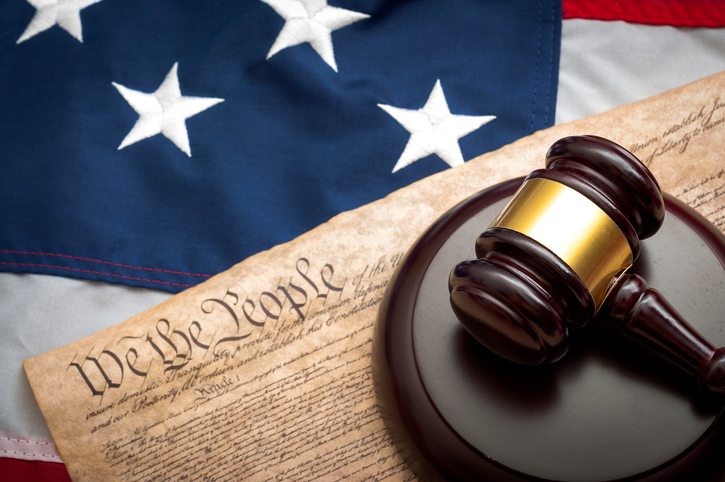 In the United States, the criminal justice system is based upon the fact that every person has certain inherent rights to life, liberty, and the pursuit of happiness. The people established the government to protect these rights, including the rights of those accused of committing a crime.
In the United States, the criminal justice system is based upon the fact that every person has certain inherent rights to life, liberty, and the pursuit of happiness. The people established the government to protect these rights, including the rights of those accused of committing a crime.
Constitutional Protections
Liberty is freedom from undue restraint, and not from rightful legal control. The U.S. Constitution provides for a federal government system and creates three branches: legislative, executive, and judicial. Each branch has special duties regarding protecting the rights of the people.
Several clauses in the body of the Constitution also protect people’s rights. For example:
- Ex post facto (“after-the-fact”) laws: The government is not permitted to enact criminal laws that retroactively criminalize actions. In other words, if a person does something that is not a crime, the government cannot later declare the action is a crime and put the person on trial. This also applies to any laws that increase the punishment for past crimes.
- Bills of Attainder: It is prohibited for the government to simply declare that a person or group is guilty of a crime and punish them.
The Bill of Rights
The Bill of Rights, or the first ten amendments to the U.S. Constitution, protects and guarantees certain rights for the people. Some of these safeguards are restrictions on the power of the government. Many of the amendments apply to criminal procedure, such as the following:
- 4thAmendment: People are not to be subject to unreasonable searches and seizures. The police must have probable cause (in the form of strong evidence) to search either a person or the person’s property. Generally, a search warrant needs to be obtained from a judge, unless the police have a strong reason to believe that a criminal act is in progress or the evidence may be destroyed.
- 5th Amendment: A criminal defendant cannot be forced to testify against him or herself. Moreover, the defendant also has the right to be warned before making any self-incriminating statements. This has become known as “Miranda Rights.”
Additionally, defendants cannot be put in double jeopardy, which means that they must not be tried for the same crime twice.
- 6thAmendment: A defendant must be provided with the right to a fair and speedy trial. This ensures that the accused cannot be left in jail for an extended period while awaiting trial.
- 7thAmendment: All persons accused of a crime are guaranteed the right to a trial by an impartial jury composed of their peers.
- 8thAmendment: Excessive bail cannot be required of anyone. If the defendant is found guilty, then excessive fines and cruel and unusual punishment are also prohibited. In essence, the punishment must fit the crime, and the judge’s sentence must be proportionate to the criminal’s offense.
Due Process & Equal Protection
Importantly, the Constitution requires both the federal and state governments to provide equal protection of the laws and due process for all people. The Fifth Amendment applies these protections to the federal government, and the Fourteenth Amendment applies to the states.
Due Process
Crimes need to be described so that individuals are reasonably aware of the conduct that is prohibited by the law. This is known as due process, and it also guarantees that all persons are treated fairly by the legal system. No one is permitted to be “deprived of life, liberty, or property” without due process of the law.
Equal Rights
All persons must be treated with substantial equality under the law. This does not mean that the government must treat all persons exactly the same. For example, juvenile offenders may be treated differently than adults. The key is that individuals in similar circumstances must not be denied equal legal protection.
